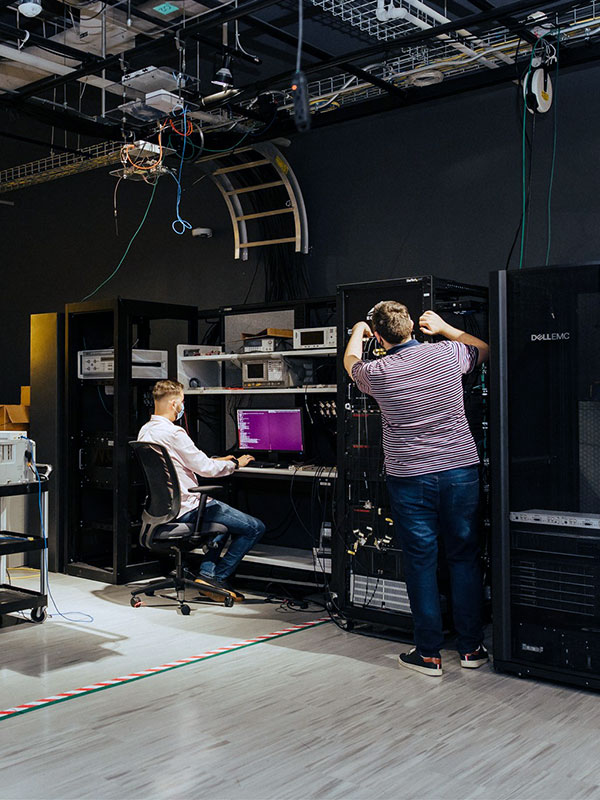Master of Science in Computer Engineering

The graduate programs in engineering from Drexel University prepare professionals for applying deepened knowledge that will further their career in research or industry. Students emerge prepared to take on the advanced needs and requirements that computer engineers use to address many of civilization’s biggest challenges.
Students in the computer engineering master of science degree work on the components, devices, programs, algorithms and systems that are used in computers, and on techniques of computation, analysis and implementation that are applicable to single computers or to entire computer systems. In this rapidly evolving field, the boundaries between related disciplines has blurred placing more importance on an understanding and ability to provide comprehensive solutions. This knowledge will empower you to address complex issues encountered in the many areas where computer engineering is in demand. Students learn about the advances in industry, gain a global viewpoint, and build entrepreneurial and teambuilding skills needed to advance careers or be prepared for entry into a PhD program.
Delivery
- On-campus
- Full-time or part-time
- The program will take approximately two years to complete on a full-time basis or can be completed on a part time basis in 3-4 years.
Curriculum and Requirements
- The master's in computer engineering requires a total of 45 credits; 21 credits of core coursework in electrical engineering; 15 credits of electives.
- A mathematical foundations requirement of 6 credits of coursework (within the 45 total credits in the MS) emphasizing the development of mathematical skills needed in the area of computer engineering are required.
- The remaining 9 credits can be completed through a coursework only, non-thesis option of independent study, or other additional concentration electives, or with 9 credits of thesis research (recommended for those interested in doctoral study). Learn more about the Master’s Thesis option.
- Graduate Certificate in Engineering Management — earn an additional credential without adding credits to your plan of study. Using electives, you will gain skills to lead projects and teams. Learn more
Visit the Drexel Catalog for more information and sample study plans for areas of specialization or learn more about our admissions requirements.
Graduate Co-op
This program is eligible for Graduate Co-op — a unique, optional three or six-month work full-time professional experience that alternates with study, available for domestic and international full-time master’s students.
About Drexel Engineering

The Department of Electrical and Computer Engineering (ECE) combines related diverse fields to educate and turn out a well-rounded engineer. Drexel students are encouraged to be innovative and imaginative in identifying a problem and analyzing potential approaches in the quest for a solution.
Programs in ECE offer versatile pathways to the work world. A great diversity of student objectives and specialties is supported by a progressive, flexible curriculum developed by our renowned faculty to address emerging trends and incorporate industry leading technology. Traditional study areas include circuits and electronics, telecommunications, power, and controls with additional areas of study and research including work in audio, optics, robotics, biomedical, and nanotechnology, robotics, self-driving cars, Internet of Things, nanotechnology, cybersecurity, computer chips, and renewable energy technologies.
The focus of Drexel Engineering programs is to equip you with the tools for finding sustainable and achievable outcomes to solve for society’s biggest challenges while making them relevant to your career goals.
Faculty
Drexel places a high value on industry connections and experience at every level. Teaching faculty in your program are experts with industry experience or are at the forefront of research and teaching.
Philadelphia
The city of Philadelphia is our campus – a diverse urban environment with a variety of social, cultural and learning opportunities that will enrich your educational experience. Philadelphia is also a draw for talented instructors and researchers, meaning you will engage with some of the best minds in engineering and other disciplines. Learn more.
Research
All students in the Master’s in Computer Engineering program are welcome to engage in research as part of their degree or as extra-curricular participation. Full-time master’s degree candidates are encouraged to base their master’s thesis on some aspect of faculty research.
Current research in the ECE Department is conducted by our world-renowned faculty, funded by the U.S. Department of Defense, Transportation, Health and Human Services, Commerce and Homeland Security as well as with many notable industry partners.
Visit research and design for more about other research activity at the College of Engineering.
Career Opportunities in Computer Engineering
Computer engineering graduate programs prepare you for a career path that could include continuing your education in a PhD program or pursuing advanced technical, research or management positions in industries such as defense, electronics manufacturing, systems design, telecommunications, automation or robotics.
Overall, employees with graduate degrees can earn up to 28 percent more than bachelor’s degree holders over the course of their career. According to the Bureau of Labor Statistics, the outlook for computer hardware engineering jobs is very good, with demand for employment expected to grow 7% through 2034, much faster than average for the overall projections for all occupations.
Apply Now Graduate Admissions Department Page